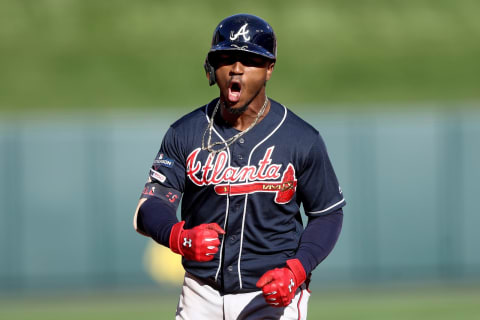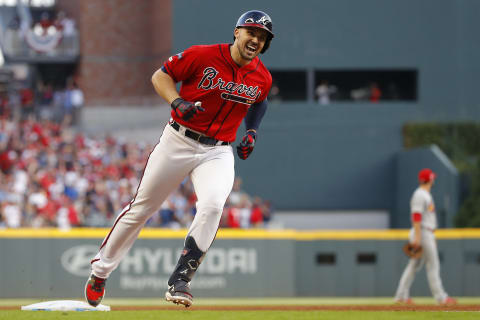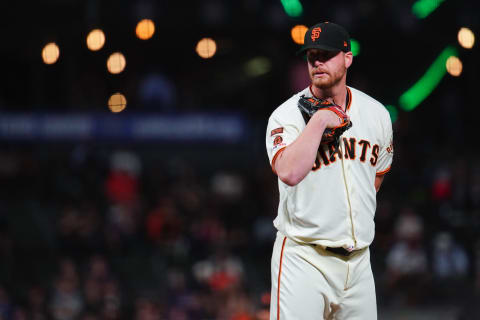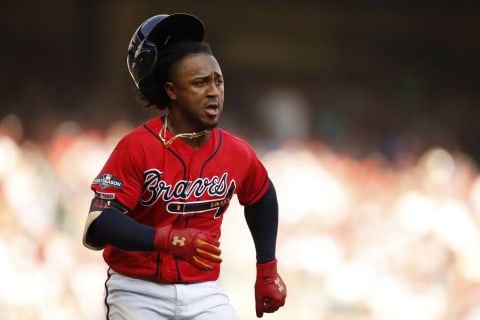3 Atlanta Braves to watch for in a 60-game season


Atlanta Braves fans can only hope that something brilliant is on the horizon.
Wednesday’s announcement of a new proposal between team owners and the MLBPA is encouraging, given that it’s been a brutally long stretch without America’s pastime, but fans of the Atlanta Braves – and all of baseball – are cautiously optimistic that perhaps the dark days will end soon.
So let’s have some fun; let’s think best-case scenario.
Hypothetically-speaking, let’s say that the recent reports of progress come to fruition in the form of a 60-70 game regular season for MLB, with all the bells and whistles of an expanded playoff and a universal DH.
How exciting would that be?
The Atlanta Braves – they of the two consecutive National League East championships – have lofty ambitions for a hypothetical (hopefully soon-to-be reality) October to remember.
Logistically, baseball in 2020, if and when it occurs, would look awfully different in terms of the entire flow of the season.
A baseball regular season, the hallmark of which is normally that of a “marathon” over the course of several long, grueling summer months, would suddenly become transformed into a mad dash to the postseason, with roughly two-thirds (or more?) of the participants jockeying for legitimate postseason spots.
With that in mind, the players that have the most success with being “quick starters” – those that typically perform far better in the first halves of seasons on a yearly basis – might reap the benefits of a 60-70 game season.
The Atlanta Braves have a few of those such players on their roster.
Could these individuals propel the Braves to a division title (or at least a postseason berth) for a third consecutive year?
Their track records indicate they play their best baseball right out of the gates.
Here’s three Atlanta Braves that could thrive in a shortened season.

Atlanta Braves fans will best remember Adam Duvall for his heroics last October, but more success could be yet to come.
For Adam Duvall, an abbreviated 2020 season might lead to success.
He has the track record, after all, of seeing his best production of the season take place right from the outset.
A look at his career splits (per baseballreference) is telling of Adam Duvall’s strength out of the gates:
- Career first half – .244 BA, .502 SLG, .799 OPS
- Career second half – .220 BA, .415 SLG, .703 OPS
There’s a stark difference in Duvall’s numbers, specifically slugging, in the early-goings of the season when contrasted with how he performs in months four through six.
Fangraphs also notes that Duvy’s power sees its peak over the course of the first few months of play, with his career ISO an eye-popping .259 in the first half (compared to .195 from the All-Star Break in the season’s later months).
Also per Fangraphs, Duvall’s career wRC+ for the first half of the season sits at right at/slightly above league average at 104, but breaks down to just 82 in the second half.
These statistics don’t even account for when Duvall clubbed 32 home runs with Triple-A Gwinnett in the first three months of 2019, before making his return to Atlanta.
Why is this all important?
Say baseball goes forth with the 60 or 70-game season proposal. Who better to benefit from the sprint-like format than a power hitter who has built his reputation on mashing baseballs when he’s fresh – in the season’s first three months?
Adam Duvall fits that bill.
Furthermore, if players and owners do, in fact, come to terms on the proposal for a universal designated hitter, Adam Duvall could see his role with Atlanta flourish in 2020.
With an outfield surplus, the Atlanta Braves would seemingly welcome the DH as an opportunity to get Duvall’s power into the lineup on a more regular basis.
“Duvy” definitely brought excitement to Atlanta Braves fans last October. He might be a dark horse to lead the charge in a shortened 2020.

Atlanta Braves reliever Will Smith has a track record to suggest he could make an impact on a short season.
There’s no question that Atlanta Braves fans were excited to see veteran left-handed relief pitcher Will Smith acquired through free agency this past (or should I say this “current”?) offseason.
The Georgia native was excellent in 2019 with the Giants, putting together an All-Star campaign as one of the game’s elite bullpen arms.
As terrific as his overall numbers look, the reliever’s career reputation is that of a strong “starter” – not starter of games, but starter of seasons.
The difference is pretty incredible.
Per Will Smith’s baseballreference “career splits” category:
- Career first half – 190 IP, 2.70 ERA, 1.08 WHIP
- Career second half – 220 IP, 4.37 ERA, 1.38 WHIP
Additionally, Smith has allowed just a .212 BA and a .626 OPS to hitters in the first months of seasons (compared to a .257 BA and a .740 OPS allowed in the later months).
It’s fair to say that the Atlanta Braves bullpen was an Achilles’ heel for the team for a large part of 2019, with its unit putting out a reliever WAR of 1.1, “meh” enough for 21st in MLB.
The bullpen, however, was certainly enhanced by the July trades for Mark Melancon, Shane Greene, and Chris Martin.
Those players are all set to return to the Braves in whatever 2020 would have to offer, and adding Smith into the fray could transform the once-middling Atlanta ‘pen into one of baseball’s best.
For whatever reason, Will Smith has proven himself as one of those players that just seems to be at optimal performance in the season’s early-goings, making him an ideal candidate for success in a hypothetical 60-70 game affair in 2020.

Ozzie Albies is a talented young player, but his value in a short season could be significantly enhanced.
Ok, fair enough.
Perhaps it’s a little silly to say that Ozzie Albies is a “player to watch out for”, given his already-established reputation as one of the game’s top young second basemen, backed by his 2018 All-Star status and 2019 Silver Slugger hardware.
But hear me out on this: in a shortened 2020 season that only consists of 60-70 games, Ozzie Albies could end up being the most important bat in the lineup.
Why? In a sprint instead of a marathon, he’s one of Atlanta’s best sprinters.
While Albies doesn’t have the longevity to this point in his time as a major leaguer to give extra context to his career numbers, he still has been around the league long enough in his 2.5 seasons to produce certain trends as a hitter.
Here’s what those trends have to say:
- Career first half – 757 AB, .285 BA, .502 SLG, .835 OPS
- Career second half – 739 AB, .273 BA, .444 SLG, .775 OPS
What we see here is a clear advantage to Albies’s performance in the early months of the season as compared to the “dog days” of the schedule.
An even deeper look within those splits finds that Ozzie Albies especially loves the first month of baseball. Per Fangraphs, he put up an OPS of .844 in March/April of 2019, and .988 in those months in 2018.
Like Adam Duvall, the Great and Powerful Oz also sees a lot more of his power production take place at the beginning of the season, with Albies toting a .217 career ISO in the season’s first half (compared to .171 in the second half).
One thing is clear in all this: Ozzie Albies is a great young player, but he’s especially great at the beginning of seasons.
Hypothetically speaking one more time, in a 60-70 game sprint, there’s no time to “get a feel for things”, no need to “save the best for the second half”.
In order for a team to have success in this bizarre scenario of a season, the quick-starters are going to be the ones to seize the day and thrust their teams into favorable postseason positions.
Ozzie Albies could very well be that guy for the Atlanta Braves, if (fingers crossed) baseball happens in 2020.
Stay tuned.